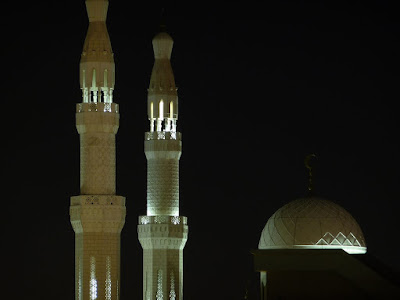The faithful are called to prayer at the appointed times by the muezzin. This gentleman sings the salahs. His chants are broadcast from the minarets of the mosques.
As you can see, the minarets are quite tall and offer a good platform for projecting the voice. I indicated that this practice had gone on for a long time. Specifically, it occurred from the time of the Prophet until the end of World War II. After the end of hostilities, there were surplus public-address speakers available. Many found their way into the tops of the minarets. Now the muezzin was spared from his climbs five times each day. Furthermore, he acquired this great and powerful electronic voice to summon the faithful. This was a good acquisition from the modern world for ancient Islam.
Ex-patriots living in the Emirates are swept along by the Islamic culture. If you live in a proximity to a mosque, prayer becomes a part of your life. The photos were taken from the balcony of my first floor flat. (If you are an American, that means a second floor apartment.) I am separated from the church by 200 meters of desert air. Needless to say, Islamic prayer is an intimate part of my life.
The only other prayer that is quite invasive is Dhuhr on Friday. Friday is the Islamic sabbath. Life for the faithful does not really start until after Dhuhr on Friday. Following prayer, the microphone is handed over to the Imam, who is the worship leader of the mosque. The volume is cranked up and a fire-and-brimstone sermon is then delivered in Arabic. It can be rather unsettling.
My wife has always told me that I could use a little "churching up", but I never envisioned that it would take place in this way. Life can be a little crazy.



0 comments:
Post a Comment